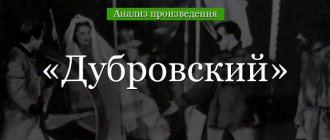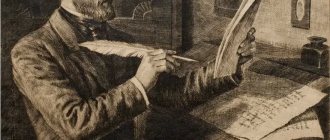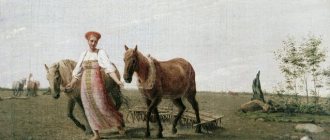- Reader's diary
- 6th grade
- Pushkin - Belkin's Stories
"Undertaker"
The undertaker Prokhorov moved to a new apartment, in which the owner’s goods—coffins—took pride of place. Prokhorov is usually thoughtful and deep in thought; lately he has been plagued by losses. The thoughts were interrupted by a neighbor, the German Schultz. He invited him to a family celebration. The next morning, Prokhorov goes to visit. What came as a surprise to him was the toast when they offered to drink to their customers. To him - for the dead, this offended Prokhorov. And returning home, he decided to invite them to a housewarming party. Finding himself in bed, the undertaker fell fast asleep.
It was still dark when he was woken up and told that the merchant's wife had died. He went on the road and did everything as expected. Prokhorov was returning home and noticed that someone had walked into the yard. At the gate he ran into another guest. His legs gave way when he entered the room; there were dead people in it, whom he had once seen off on their last journey. The owner fell to his knees and fainted.
The sun was high when Prokhorov woke up. He saw a worker at the samovar. The undertaker tried to find out about the night's adventures, but she called them nonsense.
"The Station Agent"
Our story is about a poor caretaker. On a hot day we stopped at the station, where we met him and his daughter. She was about fourteen years old, her name was Dunya. She knew how to do everything around the house, was clean and of a good disposition. She could resolve any conflict with travelers.
Several years passed, and again the same station. Everything changed, the caretaker lay under his sheepskin coat and slept. After a glass of punch, he started talking and told the story of how Dunya was kidnapped by a passing hussar. It was winter, a military man arrived at the station, and he urgently demanded horses. A scandal was brewing, but as soon as Dunya came out and invited him to dinner, the matter was settled. Suddenly the hussar felt ill, and he lingered. On the third morning, Minsky, setting off on the road, offered to give Dunya a ride to the church. Samson Vyrin gave permission and hasn’t seen her since then.
She did not return from church. Acquaintances of the coachmen said that Dunya left with the hussar. The caretaker guessed that his illness was feigned. And he decided to go to St. Petersburg, where Minsky took his daughter. He got a meeting with him. Vyrin asks to return his daughter, Minsky refuses, but promises him that Dunya will be fine with him. Saying goodbye, he hands him papers. This is money, he will throw it away. Vyrin returned home, drank himself to death from grief and died.
The last time I had to make a special stop, the station was already closed. The boy took him to the cemetery and said that once a rich lady came, came to the grave and cried bitterly.
"Peasant Young Lady"
There lived two neighbors Berestov and Muromsky. The first one increased his fortune, the second one squandered it in Moscow. They were in a quarrel.
Berestov's son came from the city. Alexey was handsome and aroused the interest of the young ladies. Muromsky had a daughter, raised on books, with an enthusiastic nature, she showed interest in him and dreamed of meeting him.
With Nastya, the maid, they came up with a plan. In the morning, when Alexey goes hunting, Lisa, dressed in a peasant dress, will have to catch his eye. Disguised, She went into the grove, where Alexey met her. Lisa happily played the role of a peasant girl, introducing herself as the daughter of a blacksmith, and he as the master’s valet. The young people started talking. Dating strengthened the mutual feelings of young people and grew into love.
Autumn approached, Berestov’s father went out for a ride on horseback. And the neighbor did the same. Their meeting was inevitable. Muromsky's horse bolted, and he fell into a ravine. Berestov had to come to his aid and invite him to tea. Old grievances were forgotten, and their friendship began. The Berestovs' return visit embarrassed Liza, but she successfully got out of this situation by smearing herself with whitewash so that Alexey did not recognize her. He didn't like her.
Meanwhile, the neighbors' acquaintance continued; they decided to marry their children. The news of his upcoming marriage to a neighbor caused a storm in his son. Knowing his father's character, he decided to get ahead of him. In the morning, Alexey was already at Muromsky’s house, where he met his beloved.
"Shot"
In one regiment a society of military men and one civilian was formed. His name was Silvio, everything that surrounded him was shrouded in mystery. One day, while playing cards, an incident occurred that surprised everyone. One officer thought that our friend made a mistake in the game and did not correct it. And he threw a heavy object at Silvio. He stood up and reminded the officer that although the offense was inflicted on him in his home, he would not take any measures against him. Everyone, knowing Silvio’s character, was surprised.
One day Silvio received a package, after reading which he announced his departure and invited everyone to dinner, and then told a story. Six years have passed since the day when Silvio received a slap in the face from a successful colleague and challenged him to a duel. The lucky man walked to the place of the duel with a cap filled with cherries and was calm. He shot first, but intentionally hit the hat. Silvio, seeing his calmness, refused his shot, but he left it behind him. He soon retired, but the thought of revenge never left him.
And now that hour has come. An acquaintance wrote to him about the offender’s marriage, Silvio decided to exercise his right to shoot. He arrived at the estate and met with the offender. Silvio announced his goal. But here, too, chance intervened; he did not want to turn his shot into a murder and demanded a lot. The offender shot first. This time he missed, was confused and a little scared. Masha, his wife, ran into the room and threw herself at his feet. Silvio was about to fire a shot in front of her, but suddenly changed his mind and said that he was satisfied with the confusion and timidity of the offender.
"Blizzard"
Gavrila Gavrilovich was a landowner, in whose house there were many guests. They were attracted by their daughter Marya Gavrilovna, seventeen years old and a rich bride. The young lady was brought up on novels and was in love with a poor officer. The young corresponded with each other, swore their love and thought about how they could get around their parents, who did not give their blessing. By winter, Vladimir persuaded her to get married secretly, and then ask them for forgiveness. After hesitation, Masha agreed. Vladimir promised to arrange everything; they planned to get married in the church of a neighboring village.
Masha did everything as agreed. Announcing sick, she got ready and went out into the garden, where the troika was waiting for her. Vladimir, having sent the horses for Masha, got ready for the road. As soon as he left the outskirts, a snowstorm broke out, so much so that nothing was visible. Having lost his way during the day, the poor groom only drove up to the church in the afternoon, but everything was locked.
Masha returned home and fell ill. No one had any idea what was planned that blizzard night. Vladimir, frightened by the publicity, left for the army. And Masha became a rich heiress. She moved with her mother to another province, there were suitors around, but she didn’t single anyone out. Until Colonel Burmin became a neighbor. Masha brought him closer and challenged him to a frank conversation. He confessed his love for her, but said that there was an obstacle to their happiness - he was already married. But he doesn't know his wife. And he told a story, the ending of which was known to Masha. The girl he was married to that night was her.
More details
Author
“The Stories of the Late Ivan Petrovich Belkin” was written by Alexander Sergeevich Pushkin. In this collection, he decided to talk about the life of provincial Russia.
Year of writing
"Belkin's Tales" were created in 1830. However, the poet began working on them earlier, in 1829. He was able to continue and complete it only a year later, when he stayed in Boldino during the epidemic.
Genre
This is a series of stories. He is united by a common narrator and author. In addition, all the stories are connected by a common theme of provincial life. Their heroes are also somewhat similar, these are ordinary landowners, their families, of which there were quite a lot in the country. The events described in each story are long in time; there are several main characters in the works.
Heroes
The story “The Undertaker”, heroes: Adrian Prokhorov, the undertaker, the German Schultz and the baker Yurko. They were all people who worked for different clients. Prokhorov is not a cowardly person, not a superstitious person, but hot-tempered and sad.
“Station Warden”, heroes: Samson Vyrin - a poor stationmaster, his daughter Dunya - a young, frivolous girl who left her father for her lover, Minsky - the officer who took Dunya away, an arrogant, rich, proud man, storyteller.
“The young lady is a peasant woman,” the heroes are landowners Berestov and Muromsky, their children Alexey Berestov and Liza Muromskaya.
“Shot”, heroes: Silvio and Count B, narrator.
"Blizzard", heroes: Marya Gavrilovna, Vladimir and Burmin.
Plot
“The Undertaker” - at the beginning of the story we learn how Prokhorov moves from one street to another and opens a new funeral shop there. He has two daughters who are not yet married. HE accepts the invitation of his neighbor, a German, and goes to visit him. The guests are feasting there. One of them says that Adrian can drink to the health of the dead for whom he makes coffins. Prokhorov gets angry and goes home to go to bed. He dreams that the dead, for whom he had recently created coffins, came to his house. When he woke up, he was glad that it was just a dream.
"The Station Agent" . This work tells about the life of a poor caretaker, his daughter Dunya. When Minsky arrives at the station, he falls in love with Dunya and takes her away. The father goes for the prodigal daughter. However, Dunya is happy, living in love with a rich officer. Vyrin returns home, from melancholy and humiliation he becomes an alcoholic and dies. Dunya comes to her father, but sees only the grave.
“The Young Lady-Peasant” - at first the Muromsky and Berestov families are hostile to each other. However, Lisa meets Alexei disguised as a peasant woman, Akulina. The young people fell in love with each other. Soon their fathers became friends, and then decided to marry the children. Lisa's deception was revealed, but this was only fortunate.
“Shot” - the young Count B and his wife suffer because of the postponed duel. Silvio is in no hurry, he wants to kill his opponent when he has something to lose. He arrives at the count's estate, the countess begs her husband to abandon the duel. Silvio shoots past and drives away.
“Blizzard” - Marya Gavrilovna and Vladimir are in love, they decide to run away to get married. The bride goes to church, but instead of Vladimir she gets married to another man by mistake. Soon Vladimir leaves for war and dies. Marya Gavrilovna meets Burmin, young people love each other. Then Masha finds out that she got married to this man.
6th grade
Reviews of the book “Belkin’s Tales” by Alexander Pushkin
Literary parodies in Pushkin style
There are cases in literature when parodies are better than the original. Those (probably fashionable in their time) works that Pushkin partly parodied in his stories have long been forgotten and have sunk, so to speak, into oblivion, all that remains of them are literary cliches, and “Belkin’s Tales”
live on and are thriving.
Moreover, you can read them with equal pleasure both in childhood, when you take everything at face value and do not suspect that the author was making fun of something a little, and later, when it is already visible to the naked eye (and in some places it is not visible at all , Honestly). It's all about how to present it. For some, stamps are just stamps.
But Pushkin’s stamps are all the same... Pushkin . This means elegant, easy, beautiful. Very short stories, but each one has a complete story, with its own twist.
All five stories are written in different styles and are unlikely to appeal to the reader equally (here, who prefers what they prefer - romanticism, realism, mysticism), but they are definitely worth getting to know. Moreover, the volume of the “cycle” is very tiny. Of course, I read it at school, and re-read my two favorite things, but now I had the opportunity to re-read the entire collection, which I did. I share my impressions.
"Shot"
This story is one of my two favorites in the series. However, despite this, it turned out that I had completely forgotten its contents. All I remembered was that it was about some kind of duel in which something went wrong. So, getting to know “The Shot” again, I had the pleasure of watching the whole story again from the very beginning. So to speak, like the first time.
Here Pushkin, excuse me, Belkin brings to our attention a very curious subject named Silvio
.
This man, seemingly not offended by his intelligence or talents, devoted a considerable part of his life to revenge. More precisely, waiting for an opportunity to implement it. And the reason for this was the stupidest (and besides, he himself was the reason for it), and all the other people had long since forgotten to think about it. But not Silvio
. As often happens, one stupid act can, if not cancel out, then greatly ruin your life. And the hurt pride... And the dueling traditions of the past... well, however, it’s better to leave them aside. It’s better to see what comes out of the hero’s attempt to finally bring his duel to the end.
"Blizzard"
Marya Gavrilovna was brought up on French novels and, therefore, was in love.
Here the parody is felt more clearly than in any other story. A kind of mystical-romantic-sentimental little thing, which, if written by a less talented author, would only be capable of causing the reaction: “Oh God, what kind of nonsense?” High feelings, strong passions, a fatal coincidence, love fever, a suddenly revealed secret - what is there, it seems that all possible stereotypes of the genre are collected. In addition, they are also deliberately exaggerated for greater clarity. But Alexander Sergeevich is true to himself, and even from such a more than strange plot he manages to make a very pleasant story. (And the blizzard is a favorite hero of Russian authors. Over the past year, I have come across stories on this topic with manic persistence).
"Undertaker"
Here we are moving away from romance towards gothic. Even from the title it is clear that the story will be fun. Coffins, dead people, skeletons... What could be more enjoyable for a genre lover? (If anything, it's not me). Professional sources tell me that Pushkin also covered Freemasonry here, but since I’m not strong in it, I can’t say anything about this. So my amateurish glance saw just a small episode from the life of the venerable undertaker, who was so offended by the offer to drink to the health of his clients that he decided to invite those same clients to a housewarming party (obviously, it was inappropriate for the living to joke about him). But, as it turned out, he was making fun of himself. It was a fun night...
"The Station Agent"
And here the bias has already gone somewhere towards Dostoevsky (it doesn’t matter that he lived and worked later, you understand what I want to say). A little man, “humiliated and insulted,” deprived of the only joy in life. A mixture of realism and sentimentalism. And all this is wonderful. In such a small volume, Pushkin managed to include a description of the life of the station guards, and the love of a father for his daughter, and an incident that turned the lives of both, and attempts to regain what was lost, and later repentance. Like a small novel on several pages.
"Peasant Young Lady"
The funniest, lightest and sunny work in the series. And my favorite. I read this story for the first time when I was 10 years old, and then I was simply delighted. Of course, now there was no such effect, but it was still pleasant to read, and I involuntarily smiled, again watching Lisa with her pranks. Still, I like these kind of cheerful, lively, spontaneous heroines much more than the romantically sublime young ladies who strive to faint beautifully at the right opportunity, the personification of which is the same Masha from “The Blizzard.” Those people make you want to grind your teeth, but you don’t want to part with people like Lisa. So you wait: what else will she come up with? It's a pity that the story is so short.
In general, if you suddenly want to refresh your memories of a book you read at school or look at it from a different angle, remember “Belkin’s Tales”
. A portion of pleasant reading is definitely guaranteed for you.
Read as part of the Hopscotch Game
(8th round, application No. 2)
Interesting topics
- Belov - Starlings
Saturday has come. Mom washed the floor. I placed clean paths on it. According to tradition, I poured small grains of sand and rubbed the surface of the samovar. Then I rearranged Pasha’s bed - Bunin - Caucasus
The hero and heroine meet in Moscow, they are in love, but cannot be together. The heroine is married, her husband watches every step and threatens with violence. She runs to her lover's hotel - Zhitkov - Jackdaw
Jackdaw has been living in people's apartments for a long time and becomes tame, without fear, eating from the palm of a person, allowing them to touch him. At the same time, the owners do not resist when the bird asks to be released - According to the work Kalina the Red,
Vasily Shukshin is a writer who surprisingly accurately managed to see people’s lives exactly as they really were, without exaggeration or embellishment.
Review of the novel by A.S. Pushkin "The Captain's Daughter"
All-Russian creative competition for students in grades 5-11
Review DOCX / 16.04 Kb
/data/files/p1603890182.docx (Review) “My review of the book I read”
Review of the novel by A.S. Pushkin “The Captain's Daughter”
8th grade student of the Osykovskaya School
administration of Starobeshevsky district, DPR
Nosko Daria
Most recently, I read one of the most famous historical novels (or stories) by Alexander Sergeevich Pushkin, “The Captain's Daughter,” which takes place during the uprising of Emelyan Pugachev. The author did a colossal amount of work, which lasted several years, because the work quite reliably indicates the dates and facts from the uprising that actually existed. Pushkin got acquainted with historical documents, family archives, and met with eyewitnesses of those events. He wanted to convey to the reader how everything really happened.
Pyotr Andreevich Grinev is one of the main characters of the novel, on whose behalf the story is told. The author believed that, unlike a scientist, a writer should paint a story “in a homely way,” show the characters in everyday life and thereby make them relatable, accessible and understandable to readers. At the very beginning of the novel, we learn that Peter is a sixteen-year-old teenager who was educated at home. Even before Petrusha was born, he was enrolled in the Semenovsky regiment as a sergeant. Peter's father believed that only in the army could a boy grow into a man, so he sent him not to Petersburg (“to hang around and hang around”), but to Orenburg (“to smell the gunpowder”).
It was here, in Orenburg, that Pyotr Andreevich Grinev met the captain’s daughter and fell in love with her.
Maria Mironova is the daughter of a captain. A kind, sweet and strong girl who was able to cope with great grief... Subsequently, she shows herself to be a very brave lady, because she goes to the empress herself for help.
Emelyan Pugachev, who is the leader of the uprising and calls himself the “great sovereign,” also plays a significant role in the story. This image in the novel is multifaceted: Pugachev is evil, generous, boastful, wise, disgusting, omnipotent, and dependent on the opinions of others. The image of Pugachev is presented in the novel through the eyes of Grinev, an uninterested person. According to the author, this should ensure the objectivity of the hero’s presentation.
After reading the novel, I was very impressed. While reading, I experienced many feelings: joy and excitement, anxiety and hope, and at some points despair. I remember many events very much; I was especially worried about the fate of Peter and Mary. But they overcame many life difficulties and obstacles to be together. Their love was so strong.
I read the work in one sitting. I advise those who have not yet read the novel “The Captain’s Daughter” to do so and share their impressions.





